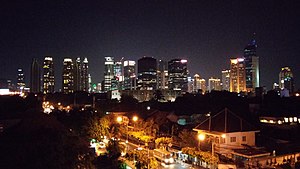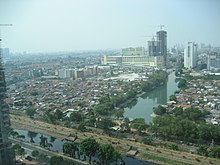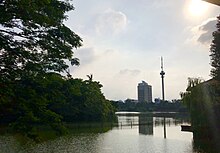Tanah Abang: Difference between revisions
HurrahHurrah (talk | contribs) No edit summary |
No edit summary |
||
| Line 19: | Line 19: | ||
It is also the name of two historic roads in [[Kelurahan]] South Petojo, [[Gambir, Jakarta|Gambir]] District. One of these roads, Tanah Abang 1, hosts the old Dutch Cemetery, now partly a museum ''[[Taman Prasasti Museum|Museum Taman Prasasti]]'' burial place of [[Olivia Mariamne Devenish]], [[Indo people|Eurasian]] wife of [[Stamford Raffles]].<ref>{{cite web|url=http://pusat.jakarta.go.id/jakpus09/pemerintahan/d/2/12/Tanah-Abang.air|title=Tanah Abang (Indonesian)|work=DISKOMINFO Kota Administrasi Jakarta Pusat|publisher=pusat.jakarta.go.id|access-date=2009-12-18}}</ref> |
It is also the name of two historic roads in [[Kelurahan]] South Petojo, [[Gambir, Jakarta|Gambir]] District. One of these roads, Tanah Abang 1, hosts the old Dutch Cemetery, now partly a museum ''[[Taman Prasasti Museum|Museum Taman Prasasti]]'' burial place of [[Olivia Mariamne Devenish]], [[Indo people|Eurasian]] wife of [[Stamford Raffles]].<ref>{{cite web|url=http://pusat.jakarta.go.id/jakpus09/pemerintahan/d/2/12/Tanah-Abang.air|title=Tanah Abang (Indonesian)|work=DISKOMINFO Kota Administrasi Jakarta Pusat|publisher=pusat.jakarta.go.id|access-date=2009-12-18}}</ref> |
||
The city's important [[Textile Museum (Jakarta)|Textile Museum]] is, contrary to |
The city's important [[Textile Museum (Jakarta)|Textile Museum]] is, contrary to what is colloquially stated, in [[West Jakarta]] ([[Kelurahan]] Kota Bambu Selatan, [[Palmerah]] District) just over the western border. |
||
==Tanah Abang market== |
==Tanah Abang market== |
||
| Line 26: | Line 26: | ||
[[Image:Weltevreden._Gezicht_op_de_Kali_te_Tanah-Abang.,_KITLV_1400475.tiff|thumbnail|right|Kali Tanah Abang (circa 1910)]] |
[[Image:Weltevreden._Gezicht_op_de_Kali_te_Tanah-Abang.,_KITLV_1400475.tiff|thumbnail|right|Kali Tanah Abang (circa 1910)]] |
||
Tanah Abang market is in the ''Kelurahan'' Kebon Kacang thus next to [[Tanah Abang railway station|Tanah Abang station]],<ref>Krismantari, Ika and Multa Fidrus. "[http://www.thejakartapost.com/news/2010/09/07/the-vulnerable-miss-out-during-exodus.html The vulnerable miss out during exodus]". ''[[The Jakarta Post]]''. Tuesday September 7, 2010. Retrieved on September 16, 2010. "Based on The Jakarta Post’s observations at Tanah Abang train station, Central Jakarta,"</ref> on the western edge. The market has been known to exist since 1735.<ref>http://tanahabangonline.com/index2.php?option=com_content&do_pdf=1&id=71 (Indonesian)</ref> The market is the main forum for textile trade orders in Indonesia and the biggest in Southeast Asia, with much of its business conducted by sample, enabling side-by-side |
Tanah Abang market is in the ''Kelurahan'' Kebon Kacang thus next to [[Tanah Abang railway station|Tanah Abang station]],<ref>Krismantari, Ika and Multa Fidrus. "[http://www.thejakartapost.com/news/2010/09/07/the-vulnerable-miss-out-during-exodus.html The vulnerable miss out during exodus]". ''[[The Jakarta Post]]''. Tuesday September 7, 2010. Retrieved on September 16, 2010. "Based on The Jakarta Post’s observations at Tanah Abang train station, Central Jakarta,"</ref> on the western edge. The market has been known to exist since 1735.<ref>http://tanahabangonline.com/index2.php?option=com_content&do_pdf=1&id=71 (Indonesian)</ref> The market is the main forum for textile trade orders in Indonesia and the biggest in Southeast Asia, with much of its business conducted by sample, enabling side-by-side comparisons of competitors in quality, design, and innovation in all types of textile applications and fashion. Major manufacturers and smaller, niche ones compete for market space. Before 2003, the market was divided into three parts{{refn|group=n|one prefixed ''Metro''; others suffixed ''Lama'', and ''AURI''}}. Part of the market was ravaged by fire in February 2003 but soon rebuilt. Extensions and dominant parts ''Blok A'' and ''Blok B'', were added in 2005 and 2010.<ref>{{cite web |url=http://tanahabangreview.com/2010/09/03/sejarah-tanah-abang/ |url-status=dead |archive-url=https://web.archive.org/web/20130307021147/http://tanahabangreview.com/2010/09/03/sejarah-tanah-abang |archive-date=2013-03-07 |title=Sejarah Tanah Abang {{!}} Tanah Abang Review}}</ref> Blok A is the largest, covering 160,000 square meters, having almost 8,000 kiosks, and is visited by about 80,000 buyers on busy days with daily transactions averaging about Rp 500 billion ($43 million). It is well-known among traders from Africa, Australasia, and much of Asia.<ref>{{cite web |url=http://www.thejakartapost.com/news/2014/02/28/weekly-5-the-tallest-largest-and-longest.html |title=Weekly 5: The tallest, largest and longest |date=February 28, 2014}}</ref> |
||
==Traffic congestion== |
==Traffic congestion== |
||
In November 2017, Governor [[Anies Baswedan]] claimed that congestion in the Tanah Abang district was caused by pedestrians, instead of due to the street vendors conducting business on the area's sidewalks and roads.<ref>{{cite news|title=Study shows pedestrians cause traffic jams in Tanah Abang: Anies|url=http://www.thejakartapost.com/news/2017/11/07/study-shows-pedestrians-cause-traffic-jams-in-tanah-abang-anies.html|access-date=23 December 2017|work=The Jakarta Post|date=7 November 2017|language=en|archive-url=https://web.archive.org/web/20171223220443/http://www.thejakartapost.com/news/2017/11/07/study-shows-pedestrians-cause-traffic-jams-in-tanah-abang-anies.html|archive-date=23 December 2017|url-status=live}}</ref> The city administration followed through by closing a 400-meter road stretch for traffic (except for [[Transjakarta]] buses) |
In November 2017, Governor [[Anies Baswedan]] claimed that congestion in the Tanah Abang district was caused by pedestrians, instead of due to the street vendors conducting business on the area's sidewalks and roads.<ref>{{cite news|title=Study shows pedestrians cause traffic jams in Tanah Abang: Anies|url=http://www.thejakartapost.com/news/2017/11/07/study-shows-pedestrians-cause-traffic-jams-in-tanah-abang-anies.html|access-date=23 December 2017|work=The Jakarta Post|date=7 November 2017|language=en|archive-url=https://web.archive.org/web/20171223220443/http://www.thejakartapost.com/news/2017/11/07/study-shows-pedestrians-cause-traffic-jams-in-tanah-abang-anies.html|archive-date=23 December 2017|url-status=live}}</ref> The city administration followed through by closing a 400-meter road stretch for traffic (except for [[Transjakarta]] buses) to accommodate the street vendors, against criticism from pedestrians, public transport drivers, and regular vendors.<ref>{{cite news|title=Public minibus drivers oppose road closure in Tanah Abang|url=http://www.thejakartapost.com/news/2017/12/22/public-minbus-drivers-oppose-road-closure-in-tanah-abang.html|access-date=23 December 2017|work=The Jakarta Post|date=22 December 2017|language=en|archive-url=https://web.archive.org/web/20171222150416/http://www.thejakartapost.com/news/2017/12/22/public-minbus-drivers-oppose-road-closure-in-tanah-abang.html|archive-date=22 December 2017|url-status=live}}</ref><ref>{{cite news|title=Pedagang Blok G Tanah Abang Heran dengan Kebijakan Anies Baswedan|url=http://www.tribunnews.com/metropolitan/2017/12/23/pedagang-blok-g-tanah-abang-heran-dengan-kebijakan-anies-baswedan|access-date=23 December 2017|work=Tribun News|date=23 November 2017|language=id|archive-url=https://web.archive.org/web/20171223120215/http://www.tribunnews.com/metropolitan/2017/12/23/pedagang-blok-g-tanah-abang-heran-dengan-kebijakan-anies-baswedan|archive-date=23 December 2017|url-status=live}}</ref> Although some observers noted that the move might be a violation of national regulations, the street vendors and some city officials praised the move.<ref>{{cite news|last1=Retaduari|first1=Elza Astari|title=Pujian dan Kritik untuk Wajah Baru Tanah Abang ala Anies|url=https://news.detik.com/berita/d-3782627/pujian-dan-kritik-untuk-wajah-baru-tanah-abang-ala-anies|access-date=23 December 2017|work=detiknews|date=23 December 2017|language=id|archive-url=https://web.archive.org/web/20171223220437/https://news.detik.com/berita/d-3782627/pujian-dan-kritik-untuk-wajah-baru-tanah-abang-ala-anies|archive-date=23 December 2017|url-status=live}}</ref> On 7 December 2018, a sky bridge was opened above the road to accommodate the street vendors.<ref>{{Cite news |date=7 December 2018 |title=Uji Coba Jembatan Penyeberangan Multiguna Tanah Abang |work=Antaranews Otomotif |url=https://otomotif.antaranews.com/foto/775600/uji-coba-jembatan-penyeberangan-multiguna-tanah-abang |access-date=20 January 2022}}</ref><ref>{{Cite news |last=Suci |first=Dionisius Arya Bima |date=12 March 2019 |title=Melihat Kondisi Skybridge Tanah Abang Kini: Dipenuhi Para Pedagang |language=id-ID |work=Tribunnews |url=https://jakarta.tribunnews.com/2019/03/12/melihat-kondisi-skybridge-tanah-abang-kini-dipenuhi-para-pedagang?page=all |access-date=20 January 2022}}</ref> |
||
==Kelurahan (Administrative Villages)== |
==Kelurahan (Administrative Villages)== |
||
Latest revision as of 15:46, 13 January 2024

Tanah Abang[n 1] is a district of Central Jakarta, Indonesia. The district hosts the biggest textile market in Southeast Asia, Tanah Abang Market. It hosts Bung Karno Stadium, in Kelurahan Gelora, and the western half of the largely skyscraper-dominated Sudirman Central Business District.
Namesakes[edit]
It is also the name of two historic roads in Kelurahan South Petojo, Gambir District. One of these roads, Tanah Abang 1, hosts the old Dutch Cemetery, now partly a museum Museum Taman Prasasti burial place of Olivia Mariamne Devenish, Eurasian wife of Stamford Raffles.[1]
The city's important Textile Museum is, contrary to what is colloquially stated, in West Jakarta (Kelurahan Kota Bambu Selatan, Palmerah District) just over the western border.
Tanah Abang market[edit]


Tanah Abang market is in the Kelurahan Kebon Kacang thus next to Tanah Abang station,[3] on the western edge. The market has been known to exist since 1735.[4] The market is the main forum for textile trade orders in Indonesia and the biggest in Southeast Asia, with much of its business conducted by sample, enabling side-by-side comparisons of competitors in quality, design, and innovation in all types of textile applications and fashion. Major manufacturers and smaller, niche ones compete for market space. Before 2003, the market was divided into three parts[n 2]. Part of the market was ravaged by fire in February 2003 but soon rebuilt. Extensions and dominant parts Blok A and Blok B, were added in 2005 and 2010.[5] Blok A is the largest, covering 160,000 square meters, having almost 8,000 kiosks, and is visited by about 80,000 buyers on busy days with daily transactions averaging about Rp 500 billion ($43 million). It is well-known among traders from Africa, Australasia, and much of Asia.[6]
Traffic congestion[edit]
In November 2017, Governor Anies Baswedan claimed that congestion in the Tanah Abang district was caused by pedestrians, instead of due to the street vendors conducting business on the area's sidewalks and roads.[7] The city administration followed through by closing a 400-meter road stretch for traffic (except for Transjakarta buses) to accommodate the street vendors, against criticism from pedestrians, public transport drivers, and regular vendors.[8][9] Although some observers noted that the move might be a violation of national regulations, the street vendors and some city officials praised the move.[10] On 7 December 2018, a sky bridge was opened above the road to accommodate the street vendors.[11][12]
Kelurahan (Administrative Villages)[edit]
The district is divided into seven Kelurahan (administrative villages) and their area codes are given:
| Bendungan Hilir | 10210 |
| Karet Tengsin | 10220 |
| Kebon Melati | 10230 |
| Kebon Kacang | 10240 |
| Kampung Bali | 10250 |
| Petamburan | 10260 |
| Gelora | 10270 |
List of important places[edit]

- Gelora Bung Karno Stadium
- Hotel Grand Indonesia (western extension)
- Jakarta Convention Center
- Karet Bivak Cemetery
- Petamburan Cemetery
- Senayan City
- Tanah Abang market
- Grid Network
- Wisma 46
- TVRI Tower
Notes and references[edit]
- Footnotes
- Citations
- ^ "Tanah Abang (Indonesian)". DISKOMINFO Kota Administrasi Jakarta Pusat. pusat.jakarta.go.id. Retrieved 2009-12-18.
- ^ "Pasar Grosir Online Busana Muslim|Tanah Abang Fashion Islami Terbaru". www.tanahabangbusana.com.
- ^ Krismantari, Ika and Multa Fidrus. "The vulnerable miss out during exodus". The Jakarta Post. Tuesday September 7, 2010. Retrieved on September 16, 2010. "Based on The Jakarta Post’s observations at Tanah Abang train station, Central Jakarta,"
- ^ http://tanahabangonline.com/index2.php?option=com_content&do_pdf=1&id=71 (Indonesian)
- ^ "Sejarah Tanah Abang | Tanah Abang Review". Archived from the original on 2013-03-07.
- ^ "Weekly 5: The tallest, largest and longest". February 28, 2014.
- ^ "Study shows pedestrians cause traffic jams in Tanah Abang: Anies". The Jakarta Post. 7 November 2017. Archived from the original on 23 December 2017. Retrieved 23 December 2017.
- ^ "Public minibus drivers oppose road closure in Tanah Abang". The Jakarta Post. 22 December 2017. Archived from the original on 22 December 2017. Retrieved 23 December 2017.
- ^ "Pedagang Blok G Tanah Abang Heran dengan Kebijakan Anies Baswedan". Tribun News (in Indonesian). 23 November 2017. Archived from the original on 23 December 2017. Retrieved 23 December 2017.
- ^ Retaduari, Elza Astari (23 December 2017). "Pujian dan Kritik untuk Wajah Baru Tanah Abang ala Anies". detiknews (in Indonesian). Archived from the original on 23 December 2017. Retrieved 23 December 2017.
- ^ "Uji Coba Jembatan Penyeberangan Multiguna Tanah Abang". Antaranews Otomotif. 7 December 2018. Retrieved 20 January 2022.
- ^ Suci, Dionisius Arya Bima (12 March 2019). "Melihat Kondisi Skybridge Tanah Abang Kini: Dipenuhi Para Pedagang". Tribunnews (in Indonesian). Retrieved 20 January 2022.

